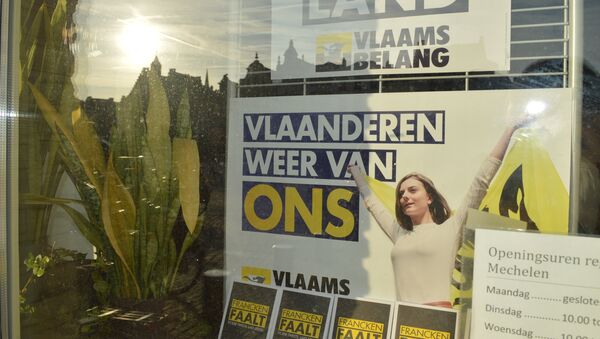The polling stations in Mechelen have been closed for several hours already, and many locals are glued to their Iphones and Ipads. The meeting at the town’s Flemish Interest headquarters is at times interrupted by screaming and applause, as everyone is watching live results coming in from the region’s 60 polling stations.
Kim Brooks was born and raised in South Africa before moving to Mechelen, where she became Flemish Interest activist and candidate. She’s discussing the results with honorary MP Frank Creyelman. pic.twitter.com/Q52RCaNq2a
— Denis Bolotsky (@BolotskySputnik) October 14, 2018
Flemish Interest is a nationalist Eurosceptic party, dedicated to defending traditional values and opposing multiculturalism, illegal migration and the 'Islamization' of the country. Its ideas are becoming increasingly popular in towns like Mechelen, where Flemish Interest was one of the few parties which actually gained votes and seats in 2018, unlike its “plunging” competitors.
The battle for hearts and minds of Belgian voters was fierce. But posters in the streets were just the top of the iceberg. Apparently, the real political wars in 2018 were fought, won and lost online. pic.twitter.com/XksNsOC6YL
— Denis Bolotsky (@BolotskySputnik) October 14, 2018
While the New Flemish Alliance, the Christian Democratic and Flemish party, and the Socialist Party lost between 3 and 9 percent of the vote in the community, Flemish Interest managed to gain 0.87%, getting 4 seats in the local council – one seat more than during the previous election.
Frank Creyelman, an honorary Belgian MP and Flemish Interest's top candidate in Mechelen, told Sputnik that his team decided to engage directly with voters via social media despite frequent verbal attacks and trolling:
“First of all, you never know if they are trolls or not,” Frank said. “We don’t have any other option, because we don’t get into the mainstream media that often. We have local television, we have television from the Belgian state here. We don’t get into the mainstream media, so Facebook and all the other social media – they are a 'gift from heaven'.”
Even though political opponents often accuse Flemish Interest of xenophobia or racism, the party refutes such accusations and says that it’s ready to work with people representing various ethnic backgrounds, all ages and all walks of life. In Mechelen, their youngest candidate is a 21-year old college psychology major, Kenzo Vandenbossche, and when it comes to ethnic background, the group includes South Africans, Russians and Mechelen-born Belgians working as a team.
Aida Osipova moved to Belgium with her parents from the central Russian city of Ufa in 1999. She quickly adapted to local traditions and culture and now speaks fluent Flemish. But Aida says that not all newcomers are alike, and she doesn’t like the way some of them treat their new home:
“Not everyone who is getting the chance to start life here is taking it as they should, what they do is profiteering.”
Frank Creyelman adds that what really matters to his party is what people do:
“The way you act is important. We are not a multicultural party, we’re multi-ethnic party.” When talking about “the checklist of qualities” for each candidate, Creyelman named only three: “They have to work with us, they have to be honest, and they have to be for Mechelen.”
While working closely with diasporas seems to have become a trend among Belgium’s political parties, some of them have got into trouble for their choice of candidates, methods and means of communication.
Two candidates prompted a storm of comments on Facebook for distributing campaign ads written in Turkish and Arabic, with some critics wondering whether either of them “suddenly became official languages in Belgium.”
A CD&V candidate with Kosovar roots, Rediard Cankia, spent a month in a French prison as a suspect in a drug-trafficking case after he was pulled over driving a car containing 3 kilos of heroin, with a street value of hundreds of thousands of euros; however, was acquitted right before the election. It’s unclear, however, whether this particular incident affected the final outcome for the party.
CD&V candidate intercepted in car with 3 kg hidden heroin https://t.co/izTQhlbVFA
— Expats in Belgium (@ExpatBelgium) September 10, 2018
A group of locals in the province of East Flanders who call themselves “The Pokemon List” and have no political agenda or program whatsoever, won the hearts and minds of some voters, with “because we can” being the primary explanation for the whole campaign.
Today was election day here in Belgium, and in one of our provinces there’s literally a party called “Pokemon-list” hahaha #Verkiezingen #Elections #Vlaanderen #België #Belgium pic.twitter.com/5gn3ue6xe2
— Armin 🇧🇪 (@Armin00_) October 14, 2018
East Flanders also made it into the national headlines because of the “PISS-OFF” party – a local male and female feminist collective promising to fight against “patriarchal sanitary discrimination.”
Unlike many other countries, Belgium has mandatory voting system, so perhaps for some of those who didn’t want to pick from the parties they dislike, casting ballots for the “Pokemon List” or “PISS-OFF” became a form of protest.
Belgian author and philosopher Brecht Arnaert suggested that people should vote for a non-existent party, like “the Party of the King,” which would make their ballot invalid, and prevent their votes from being “stolen” by other politicians.
Sunday’s local elections were held in 580 provincial, district and municipal councils. Besides Belgian nationals, EU citizens who reside in the country were also able to cast their ballots. More than 14% of candidates in Flemish towns have immigrant background. Even though there’s been an increase in social media activity ahead of the election, the voters were prohibited by law from making selfies at the polling stations, or broadcasting the voting process via Facebook, Twitter and other platforms.




